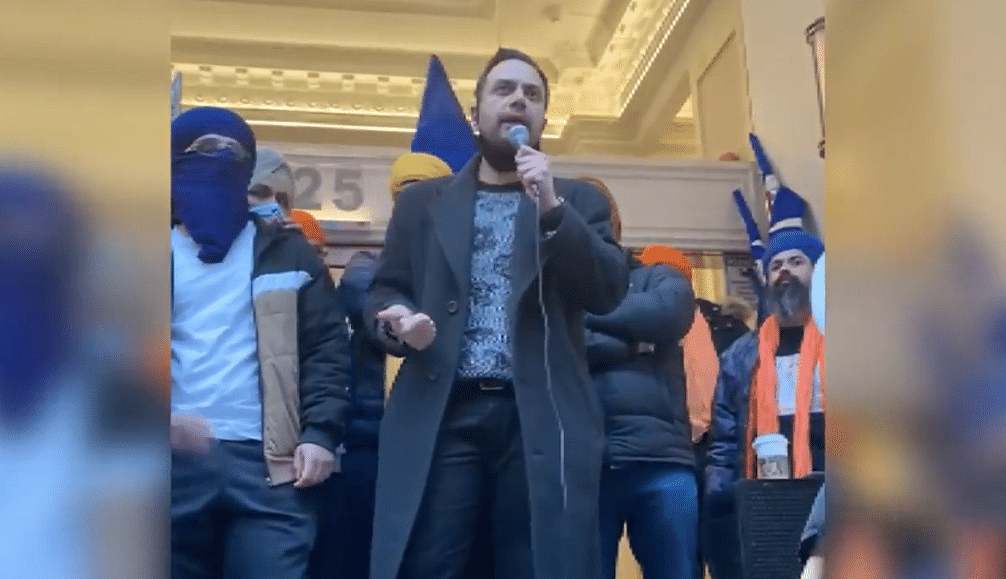New Delhi: The ‘protest toolkit’ shared by Swedish environmental activist Greta Thunberg has garnered a lot of controversy, the latest escalation in developments being the arrest of Disha Ravi, a 21-year-old environment activist.
In episode 684 of ‘Cut the Clutter’, Editor-in-Chief Shekhar Gupta expands on the toolkit issue, the people and organisations accused of being involved in it and how well-meaning activists might have unwittingly got caught up in the international farmer protest activism infiltrated by Sikh separatist individuals and organisations.
Also read: What is toolkit? Document key to tech-era protests that has landed Disha, Nikita in trouble
What is a toolkit
A toolkit is a document with knowledge and facts that helps a campaigner create tweet storms, explained Gupta. “There’s nothing in the toolkit that sounds subversive or is instigating violence,” he added. But Delhi Police believes because the toolkit asks for action in front of government offices, embassies and even in front of the offices of corporate leaders Ambani and Adani, there’s a hint of subversion. The Delhi Police also cites the website ‘askindiawhy.com‘ which is an external link in the famers’ protest toolkit — they argue it is a Sikh separatist operation.
Toolkits are standard operating procedures and are commonly made for mass agitations, “A toolkit by itself is not a criminal plan of action,” said Gupta, “A toolkit is a legitimate plan to carry out peaceful protests. We don’t have any evidence of subversive activity in this toolkit,” Gupta said. However, he added, that the external links provided for additional resources do seem to offer slightly subversive advice.
These toolkits also offer tactical advice in terms of police action — “For example, during the Hong Kong protests, the protesters and the leaders were worried that there were too many cameras and that the Chinese were watching everywhere. They were also using artificial intelligence to identify people. So they said use helmets and use masks, so you will not be identified — the masks are also to protect you from tear gas,” Gupta said.
The police says the toolkit is a dynamic document on which anyone can make changes, and that it was an action plan that was accidentally shared. The Delhi Police alleges that the events of 26 January 2021 were a copycat version of the actions described in the toolkit. “The toolkit doesn’t say anything about invasion of the Red Fort or the unfurling of the Sikh religious flag but Delhi Police insisted, in a statement, that that these people plan to create disharmony among various social religious and cultural groups and encourage ill will and disaffection against the Government of India,” Gupta said.
Also read: Greta toolkit ‘tip of iceberg’ — India sees ‘organised attack piggybacking’ on farm protest
Organisations involved
Gupta then elucidated on some of the new acronyms and organisations involved in the alleged toolkit issue.
Along with FFF — Fridays for Future, of which Ravi is a co-founder — another organisation in question is Most Affected People and Areas (MAPA), which in the past has been involved in various kinds of environmental activism in India, including objecting to the metro shed in Aarey in Mumbai.
At the centre of this jigsaw, Gupta said, is Manmendar ‘Mo’ Dhaliwal who runs an advertising agency in Vancouver, Canada. Dhaliwal’s organisation worked closely with the socialist National Democratic Party led by Jagmeet Singh.
On 17 September 2020, Dhaliwal had written that he is a Khalistani, going on to say that Khalistan is a living, breathing movement.
On 3 June 2020, Dhaliwal had also uploaded a picture of Jarnail Singh Bhindranwale on his Facebook page and had written under the picture, “Freedom from slavery is achieved only when a person starts to feel and understand that he would prefer death to life as a slave.” Dhaliwal is also a co-founder of the Poetic Justice Foundation.
Sikhs for Justice (SFJ) also planned to hold a worldwide Sikh referendum in 2020 to decide if they want the creation of a Khalistani nation or not.
In a pre 26 January FIR, the National Investigation Agency had said that SFJ plans large scale disruptive activities, damage to government and private properties, and to disrupt supplies and essential services to the capital.
Gurpatwant Singh Pannu is the prime mover of SFJ, and is now a designated terrorist.
Gupta said the Delhi Police is tying everything in the farmers’ protest movement to Sikh separatism because the most committed agitators in the protests are from Punjab.
Another less talked about organisation in question is XR or ‘Existential Rebellion’. The organisation says that they have no religious, political and financial motive or agenda — this platform is for researching, discussing, editing and circulating toolkits. Since they might have made the toolkit, they’re being charged by the Delhi Police.
There are also concerns that Pakistani-funded ISI organisations are trying to “fish in these troubled waters,” Gupta added.
Gupta also said that environmental activists like Disha Ravi and Nikita Jacob got involved with some of these people without fully understanding their background, and that there is no evidence to suggest that they want to separate or break India into pieces.
Watch the full CTC episode here:
(The article has been updated to reflect that Manmendar ‘Mo’ Dhaliwal is the co-founder of the ‘Poetic Justice Foundation’, not ‘Sikhs For Justice’. The error is regretted.)
